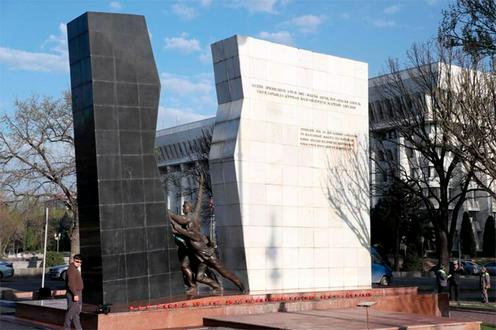 Monument to those who died for the freedom of the people, Bishkek. Photo: Press service of the President's Administration of Kyrgyzstan
Monument to those who died for the freedom of the people, Bishkek. Photo: Press service of the President's Administration of Kyrgyzstan
On April 7, Kyrgyzstan marked the 15th anniversary of the April Revolution. Flowers were laid at the «Monument to those who died for the freedom of the people» by Vice Prime Minister Edil Baysalov, Minister of Culture Mirbek Mambetaliev, and Bishkek Mayor Aybek Junushaliev, according to the government press service.
«This year we celebrate both the 20th anniversary of the People's Revolution on March 24 and the 15th anniversary of the events of April 7. These dates will forever be etched in the history of our country, and today we honor their memory. Our people fought for justice, for the purity of power, and for their freedom. It is very encouraging that, unlike the past, today we see unity between the people and the government. Today, all the hopes and aspirations of the people are being realized,» said Edil Baysalov during the ceremony.
There was no report of President Sadyr Japarov's participation in the commemoration events. Former President Almazbek Atambaev, who was one of the leaders of the opposition in April 2010, addressed the public via social media. In October 2011, Atambaev won the presidential election and led the country until November 24, 2017, becoming the first Central Asian head of state to voluntarily step down after his term ended.
Atambaev called April 7 «a special day in the history of the country,» noting that the date evokes mixed feelings—«pride for the people who rejected tyranny and sorrow for those who died on Ala-Too Square and those who died from injuries in the years that followed.» He emphasized that it was after the revolution that Kyrgyzstan began to be called «the country of free people.» Atambaev also acknowledged the efforts of the Kyrgyz government to strengthen regional security and develop the country’s infrastructure and once again called on the authorities to improve cooperation with civil society, political forces, business, and the media.
ℹ️ Fifteen years ago, on April 7, 2010, mass protests in Kyrgyzstan led to the overthrow of President Kurmanbek Bakiyev. The protests were sparked by discontent with the family-clan regime, the persecution of activists, and illegal detentions. Thousands gathered at Ala-Too Square in Bishkek, where they clashed with security forces. During the storming of the «White House» (the official residence of the president and parliament), gunfire broke out, resulting in 86 deaths and hundreds of injuries. Bakiyev fled the country.
Following these events, the opposition formed a Provisional Government led by Roza Otunbayeva. However, the violent events were accompanied by looting and disorder, for which almost no one was held accountable. Later, investigations and trials were held in connection with the looting, but many accusations remained unproven.
After Bakiyev’s flight to Belarus, he was sentenced to life imprisonment in his homeland for the shooting of demonstrators, though the sentence was later reduced to 30 years, suspended. His relatives and allies also received various prison sentences. However, attempts to extradite Bakiyev were unsuccessful.
In 2011, the Kyrgyz parliament declared April 7 as the Day of the People's April Revolution, making it a public holiday. However, beginning in 2025, this day will no longer be celebrated as a holiday.
The events of April 7 continue to be a subject of debate: some view them as a people's revolution, while others consider it a state coup. Opponents of the Bakiyev regime call this day a symbol of the fight for freedom, while supporters of the former president argue that the coup was organized by foreign intelligence services.









